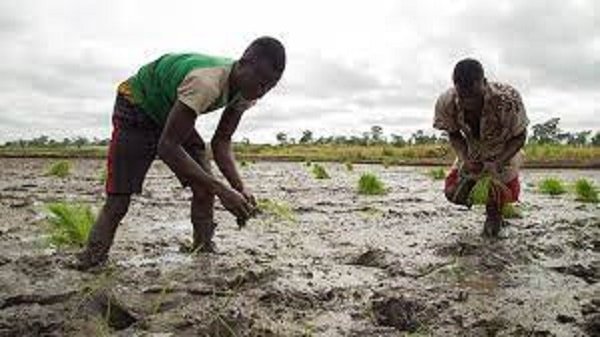Rice farmer groups in the Greater Accra and Volta regions are advocating for the adoption of new rice varieties to improve access to enhanced rice seeds.
The groups include the Dawhenya Rice Irrigation project, Kpong Irrigation Scheme, Aveyime Rice project, and Ashaiman rice irrigation project.
Their call comes in response to the development of 12 rice varieties by the Crop Research Institute of the Centre for Scientific and Industrial Research (CSIR) in collaboration with the Korea Programme for International Cooperation in Agricultural Technology (KOPIA). These varieties include Jasmine-85, CRI-Enapa, CRI-Dartey, CRI-Amankwatia, CRI-Agyapa, CRI-Korea Mo, Legon-1, CRI-Onuapa, CRI-AgraRice, CRI-Kantinka, ISRIZ-6, and ISRIZ-7.
During a tour of the demonstration fields for these new rice varieties in Dawhenya near Tema, representatives from the farmer groups expressed their support for the new varieties. Richard Martey Adler, Chairman of Dawhenya Local Rice Farmers, highlighted the unique characteristics of the new varieties that ensure high yield and grain quality. He cited CRI-Agyapa as an example, emphasizing its disease resistance and grain quality that meets the preferences of Ghanaian consumers.
Joseph Kofi Akpafu, an Executive Member of the Water Users Association operating at the Kpong Irrigation Scheme, emphasized the relief these new varieties bring to rice farmers who previously struggled to access improved rice seeds. He noted that some farmers were at risk of losing their businesses due to disease and pest infestation.
With Ghana’s goal of reducing rice importation and achieving rice self-sufficiency, these new rice varieties are considered crucial for the country to attain its objectives within the next five years.
“These new varieties will inure to the benefits of farmers because we are assured of quality rice grains that is in demand and gives us an opportunity to expand production to meet the demand,” he added.
Samuel Debrah, Project Manager of Aveyime Irrigation Scheme, said the new varieties would help to address limited rice seed varieties in Ghana, and allow farmers to cultivate various rice varieties depending on the nature of farmland.
He explained that, the ready-made information about the rice varieties would also enable farmers to make informed decisions, and serve as advice to farmers on rice cultivation
Catherine Norvi Sogbadzic, Rice Aggregator and Processor at Akuse, said the new varieties were easy to mill, adding that the growing demand for it could serve as the catalyst to reduce rice importation.
On his part, Dr Maxwell Darko Asante, Deputy Director, CSIR-Crop Research Institute, said the new varieties had qualities such as early maturing, high yielding, good grain quality and aroma as preferred by most Ghanaian rice consumers.
Also, he noted that, the new rice varieties were disease and pest resistant and had short maturity period of 105 to 115 days.
Dr Kim Choong-Hoe, Director of KOPIA Ghana Centre, said, the centre was working towards providing 5,200 tonnes of improved rice seeds to Ghanaian farmers to enhance rice cultivation.
He noted that, the centre had acquired about 100 hectares of farmland to cultivate the rice seeds of the new varieties.

